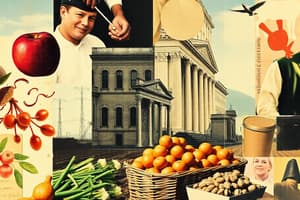Podcast
Questions and Answers
What is the primary purpose of government subsidies in agriculture policy?
What is the primary purpose of government subsidies in agriculture policy?
- To stabilize farm income and support rural communities (correct)
- To reduce the need for innovative technology in farming
- To discourage the growth of agricultural markets
- To increase dependency among farmers
What is the goal of sustainable agriculture practices?
What is the goal of sustainable agriculture practices?
- To reduce ecosystem services and degradation
- To minimize negative impacts on natural ecosystems while enhancing ecosystem services (correct)
- To maximize resource inputs and intensification
- To ignore the conservation of biodiversity
How can farmers mitigate risks in agriculture?
How can farmers mitigate risks in agriculture?
- By reducing the number of crops grown
- By employing crop insurance, financial hedging, and diversification (correct)
- By ignoring natural disasters and market fluctuations
- By engaging in unfair competition practices
Why do some criticize government subsidies in agriculture?
Why do some criticize government subsidies in agriculture?
What risks do farmers face that threaten their profitability?
What risks do farmers face that threaten their profitability?
Why is it essential to understand the interplay between supply and demand, agricultural trade policies, and risk management in agriculture?
Why is it essential to understand the interplay between supply and demand, agricultural trade policies, and risk management in agriculture?
What happens to prices in agriculture when there is overproduction?
What happens to prices in agriculture when there is overproduction?
How do supply and demand dynamics affect farmers' decisions?
How do supply and demand dynamics affect farmers' decisions?
What plays a crucial role in managing global food security according to the text?
What plays a crucial role in managing global food security according to the text?
How do governments regulate the agriculture process?
How do governments regulate the agriculture process?
Which aspect is NOT typically involved in agriculture economics according to the text?
Which aspect is NOT typically involved in agriculture economics according to the text?
What do farmers prioritize when there is little supply in agriculture?
What do farmers prioritize when there is little supply in agriculture?
Flashcards are hidden until you start studying
Study Notes
Agriculture Economics: Understanding Supply and Demand, Trade Policies, Risk Management, Sustainability, and Subsidies
Agricultural economics is a multifaceted field that encompasses various aspects of food production and distribution. It involves understanding how farmers manage their land and resources, how consumers purchase and utilize these goods, and how governments regulate this entire process. In this article, we will delve into several key components of agriculture economics: supply and demand dynamics, international trade policies, risk management strategies for farmers, sustainable agriculture practices, and the role of government subsidies in the industry.
Supply and Demand Dynamics
The basics of economics revolve around the principles of supply and demand. When it comes to agriculture, if there's too little supply (fewer crops), prices rise due to scarcity; conversely, when there's overproduction (too many crops), prices fall because of abundance. This dynamic relationship between supply and demand can significantly impact farmers' decisions regarding what and how much they produce, as well as consumers' choices about which products to consume and where to buy them from.
International Agricultural Trade Policies
International agricultural trade policies play a crucial role in managing global food security and ensuring fair market conditions for both exporting and importing countries. These policies often aim to protect local industries by setting tariffs or quotas on imported goods, while also seeking benefits such as access to new markets or reduced competition within the country. However, there are controversies surrounding certain practices, like dumping (selling goods below cost) or subsidizing exports, which can lead to unfair competition with other nations.
Managing Risks in Farming
Farmers face numerous risks that threaten their ability to make a profit or even stay in business. Natural disasters like droughts, floods, or pests can wipe out entire harvests. Fluctuations in market prices and exchange rates can affect the value of exported goods. Prolonged periods of low commodity prices can reduce the incentive for investment, leading to fewer innovations in technology, machinery, and agronomy. To mitigate these risks, farmers may employ various risk management strategies, including crop insurance, financial hedging, and diversifying their farms by growing multiple types of crops.
Sustainable Agriculture Practices
Sustainable agriculture refers to farming methods that focus on environmental protection, economic viability, and social equity. This approach aims to minimize negative impacts on natural ecosystems, while maintaining or enhancing ecosystem services, reducing resource inputs, degradation, pollution, and waste, protecting natural habitats and conserving biodiversity. Implementing sustainable agricultural practices requires a shift in mindset from using short-term input intensification to longer-term holistic approaches, such as integrated crop, nutrient, and pest management.
Government Subsidies and Their Impact
Government subsidies have been a common tool used in agriculture policy. They can take many forms, including direct payments, price supports, loan programs, and tax deductions. While some argue that subsidies help stabilize farm income and support rural communities, others contend that they distort markets and create dependency among recipients. Additionally, the incidence of corruption and misuse has led to criticism of the system.
In conclusion, understanding the complex interplay between supply and demand, agricultural trade policies, risk management, sustainable practices, and governmental subsidies is essential for those involved in the agriculture industry—from farmers and consumers to policymakers and researchers alike. By navigating these factors effectively, it becomes possible to ensure worldwide food security, promote economic development, and preserve our planet's resources for future generations.
Studying That Suits You
Use AI to generate personalized quizzes and flashcards to suit your learning preferences.




